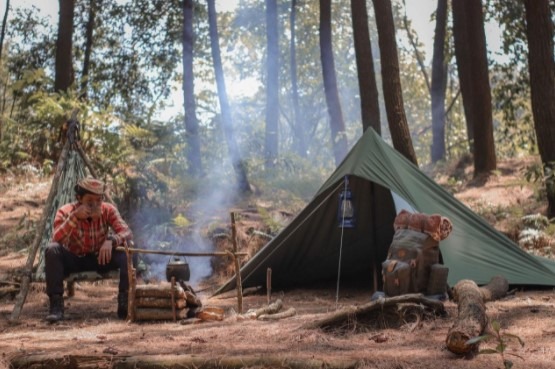According to statistics, a whopping 77 million families in America have at least one member who goes camping regularly. It’s far from a niche interest or a quaint little activity that only the selected few like to indulge in. While most people will prefer the comfort of a regular hotel than the adventurous discomfort of nature, those who are in love with fresh air, greenery, and peace have plenty of opportunities to enjoy themselves.
But knowing that you can camp doesn’t necessarily translate into you actually camping. How do you know what to pack? What kind of destination should you choose? Should you do some sort of exercise beforehand? What about food?
So many questions, but luckily, we have the answers. If you’re a beginner who’s interested in taking their first camping adventure in the wild, this is what you need to know.

Get a good tent and sleeping bag
You should even begin to think about wildlife camping without proper equipment, and your tent and sleeping bag are going to be essential if you plan to spend time in nature. A good quality tent that suits your height is the first thing to buy, and you want to make sure you practice putting the tent up before you actually head out.
A warm sleeping bag is also important, and you might want to add a thick sleeping pad in there too, especially if you have trouble getting comfortable or you expect to set up camp on rockier surfaces.
Bring the right tools
One thing people tend to forget is a flashlight. It makes sense – most of us believe we’ll be able to rely on the light from our phones, but this kind of thinking comes from inexperience. When you go camping it tends to get pitch black at night no matter where you are, and you need serious lighting if you don’t want to trip and fall over in the dark. If you plan to hang out in the evening a few portable lanterns can also come in handy.
Among other essential tools are sharp automatic knives because they are very versatile and can be used for anything from cutting branches to cutting your food. A small axe might also be a good idea, especially if you want to chop some wood to make a fire.
Stock up on food
Campers need fuel, so you want to make sure to bring plenty of snacks for the road in addition to lunch, dinner, and breakfast foods. We recommend bringing canned food and other non-perishables. You can also bring something to cook, but bear in mind that while a small gas stove can absolutely make you a good meal, you might feel too tired to actually put in effort after a long hike.
One thing you definitely want to have with you is a bag of GORP (good old raisins and peanuts). It’s easy to snack on, healthier than chips, and it will give you an instant energy boost whenever you need it.
Put it all in a good backpack
You should always try to bring as few things as possible, but even if you do manage to pack only what is absolutely necessary, you’ll still carry a lot. That’s why you need to get a good backpack, made specifically for camping.
These kind of backpacks will allow you to easily attach your tent and sleeping bag to them, and they’ll also likely have hip straps that will make sure the weight you carry is more evenly dispersed.
Always wear layers
As you hike in the sun you’ll likely need only a shirt, but once the sun goes down and you set up a tent for the night it gets much, much colder. This is why layers are so important. You’ll be able to shed them easily should you get too hot, and they’ll keep you warm if you pile them on when it gets cold in the evening.
Bring some entertainment
You absolutely don’t need anything special to have fun camping, but you might want to bring a book to read in the evening or your tablet so you could watch a movie if you feel like it. Try not to pack too many things – stick to one novel (perhaps from this list) and it’ll be more than enough to keep you entertained during downtimes.
Do some physical prep
While camping is not the most demanding thing you can do, it still requires some endurance and strength. You can use camping itself to build that endurance and strength, but you might be more comfortable on your adventure if you take some time to prepare beforehand.
A steady workout routine should do the trick – stick to light cardio and strength exercises and try to work out at least a few times a week.
If you’re a first-time camper, keep these tips in mind. Don’t worry too much about the small details and try to relax. You’re likely to have a great time, especially if you come prepared.
I’m a 20-something stay-at-home mother and wife. I have an amazing husband, a beautiful daughter, two loving dogs, and a lazy cat. I wouldn’t change my life for anything! I love to read, listen to music, cook and blog!

Speak Your Mind